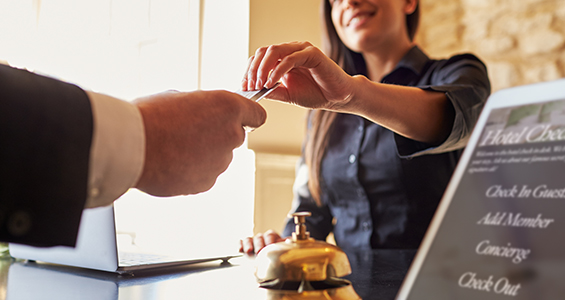Hospitality Marketing is the sub-specialty of marketing that deals with marketing restaurants, clubs, hotels, cruises, tours and resorts. In the online MBA program at Southeastern Oklahoma State University, you can take courses that prepare you to identify your ideal customers, learn what it is they seek and create materials that present the experience you offer.
1. Identify what is most important to your customers and meet that need.
To do this, you can use one of two approaches: you can guess, or you can give customers a range of options. The more effective approach is to learn all you can about your ideal customers through focus groups, surveys and interviews. It is likely that your customers will fall into segments, and each segment will have particular needs and desires. It is also likely that all of your customers will have a few values in common.
Rare is the customer who doesn’t mind a lengthy check-in process. Some may dislike complicated check-in procedures more than others, but the fact remains that if you streamline check-in, you can satisfy customers from several segments. For customers requiring more information or assistance during check-in, having staff in place to help them immediately may be a good use of personnel. The same holds true for cruise guests and first-time visitors to a club or resort. Most would rather dive into the enjoyment than spend time checking in.
By promoting the most important and meaningful parts of the experience to your potential customers, you are more likely to grab their attention and prompt them to follow up and learn more — or actually make a reservation.
2. Focus on the experience.
A speedy check-in will make no difference if the rest of the experience is lackluster. Your hospitality marketing must attract customers by convincing them that your destination is worth their time and money — and then you must deliver on this messaging. If the experience is luxurious, then market luxury. If family time is your forte, market that. If your resort offers solitude, highlight it as a place to replenish one’s energies. Show rather than tell. A bulleted list of facilities is mere information. Showcasing customers using the facilities in fun, enjoyable ways creates appeal.
3. Do not overpromise.
Marketing the ideal experience is one thing. Marketing an experience you cannot possibly deliver is another. The experienced traveler knows that every vacation has snags and bumps in the road. It is better to say you have a concierge who will help guests have the best experience possible than market your property as a utopia. It is also wise to market an experience that includes some downtime. Taking the time to watch a typical customer go through the day at your facility can give you a good feel for which of your offerings customers enjoy most. By enrolling in an online MBA program, you can learn reliable techniques for capturing and analyzing this data.
4. Use social media to create content that brings your ideal customer to your site.
Social media reaches people who may never visit your website. By using custom content as part of your hospitality marketing program, you can connect with your customers and bring them to your website for more in-depth experiences. Your content can include posts about seasonal activities, conferences, art shows, landmarks to visit, concerts — anything related to your facility. Your customers may search for the topic of your content, find and read it, and ultimately follow a link to your site. In this fashion, you can make it easy for interested customers to find you while increasing the chance that they will share your content with others.
5. Respond to reviews.
An effective hospitality marketing program includes timely responses to both positive and negative reviews. Thanks — and an invitation to return — are in order for every fifth or so positive review. Every negative review should receive an expression of regret along with an invitation to contact a specific person who can address the complaint. To offset the damaging effects of negative comments, it is critically important to respond to each one to make it clear that customer satisfaction is your top priority.
Learn more about the SOSU online MBA with an emphasis in Hospitality Management program.
Sources:
Effective marketing strategies for the hospitality industry
An Effective Marketing Plan for the Hotel and Restaurant Industry
